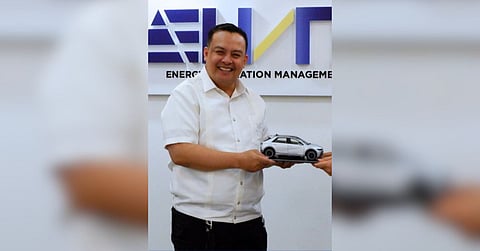
- NEWS
- the EDIT
- COMMENTARY
- BUSINESS
- LIFE
- SHOW
- ACTION
- GLOBAL GOALS
- SNAPS
- DYARYO TIRADA
- MORE

Felix William “Wimpy” Fuentebella is at the forefront of the country’s push for a sustainable energy future. His career, spanning from the halls of Congress to his current role as Undersecretary of the Department of Energy (DoE), reflects a steadfast commitment to innovation and public service.
Fuentebella’s leadership is marked by a focus on modernizing energy policies, promoting renewable resources and prioritizing the needs of Filipino consumers.
Born on 5 February 1975, he grew up in Tigaon, Camarines Sur, as a scion of one of the country’s prominent political families.
His great-grandfather served as governor of Ambos Camarines during the American period, and his parents — Arnulfo P. Fuentebella, a former congressman and Evelyn Buquid, a former mayor — instilled in him a deep commitment to public service.
These individuals shaped his journey from a young age, culminating in a career that bridges politics, law and energy policy.
After earning degrees from Ateneo de Manila University and the University of the Philippines, Fuentebella completed his legal studies at San Sebastian College-Recoletos.
He began his political career early, winning a seat in the House of Representatives at just 26 years old, representing the 3rd District of Camarines Sur. His entry into politics was more than a continuation of his family legacy — it marked the beginning of his mission to innovate and lead.
Today, as a Department of Energy Undersecretary, Fuentebella has emerged as a central figure in the Philippines’ transition to sustainable energy.
Among his notable endeavors is the push for electric vehicle adoption. Recognizing the potential of EVs to revolutionize transportation and combat climate change, Fuentebella has spearheaded efforts to establish the necessary infrastructure.
Under his leadership, the DoE has facilitated the installation of over 800 EV charging points across 120 locations nationwide, with plans to add 100 more annually.
At the launch of Tesla’s first Supercharging station in Bonifacio Global City, his optimism was evident. “We’re confident that we will have more electric vehicle users, and that will help a lot in the strategy of the Philippines in pushing for more greenhouse gas emissions reduction,” Fuentebella said.
Tesla’s cutting-edge technology, which can charge vehicles to 120 kilometers in just five minutes, is a promising step forward in addressing accessibility — one of the largest barriers to EV adoption in the Philippines.
However, the road to widespread EV usage remains challenging. EVs currently account for only a fraction of the 40 million vehicles on Philippine roads.
Fuentebella remains undeterred, noting that many light electric vehicles are unregistered, suggesting the actual numbers are higher.
He collaborates with lawmakers and agencies like the Land Transportation Office to address these data gaps and refine policies that support the EV industry.
Beyond EVs, his energy vision extends to attracting foreign investments and modernizing the country’s energy policies.
Through initiatives like the amended Electric Vehicle Industry Development Act, he advocates for measures that position the Philippines as a competitive player in the global EV market. His efforts reflect a broader economic strategy, tying sustainability to long-term national growth.
His commitment to sustainability isn’t limited to his professional endeavors. At home, he is a devoted family man, married to Geraldine “Giselle” Molina Fuentebella, with whom he shares a daughter. His family serves as both his anchor and inspiration, reminding him of the importance of leaving behind a better world for future generations.
As a guest in DAILY TRIBUNE’s Straight Talk, Fuentebella’s pragmatic yet hopeful approach to energy issues was on full display.
He reassured viewers of the country’s sufficient power supply despite surges in demand and addressed concerns over “bill shock” during the Covid-19 pandemic. Encouraging households to embrace energy efficiency, he emphasized the potential of smart technologies to empower consumers.
Wimpy’s advocacy for clean energy also includes exploring nuclear power as a viable option. While he acknowledges the complexities and long-term commitment required, he underscores its potential for providing reliable and affordable energy.
He championed competitive selection processes, ensuring energy providers deliver the best technology at the lowest cost to benefit Filipino households.
For Fuentebella, energy policy isn’t just about powering homes and businesses; it’s about empowering people and fostering a sustainable future.
As he looks ahead, his vision for the Philippines is clear: a nation powered by clean energy, driven by innovation and thriving on sustainable growth.
His work reflects a profound sense of duty — not only to his constituents but also to the next generation. With his steady hand and forward-thinking leadership, Fuentebella is helping chart a course toward a greener, brighter future for the country.
